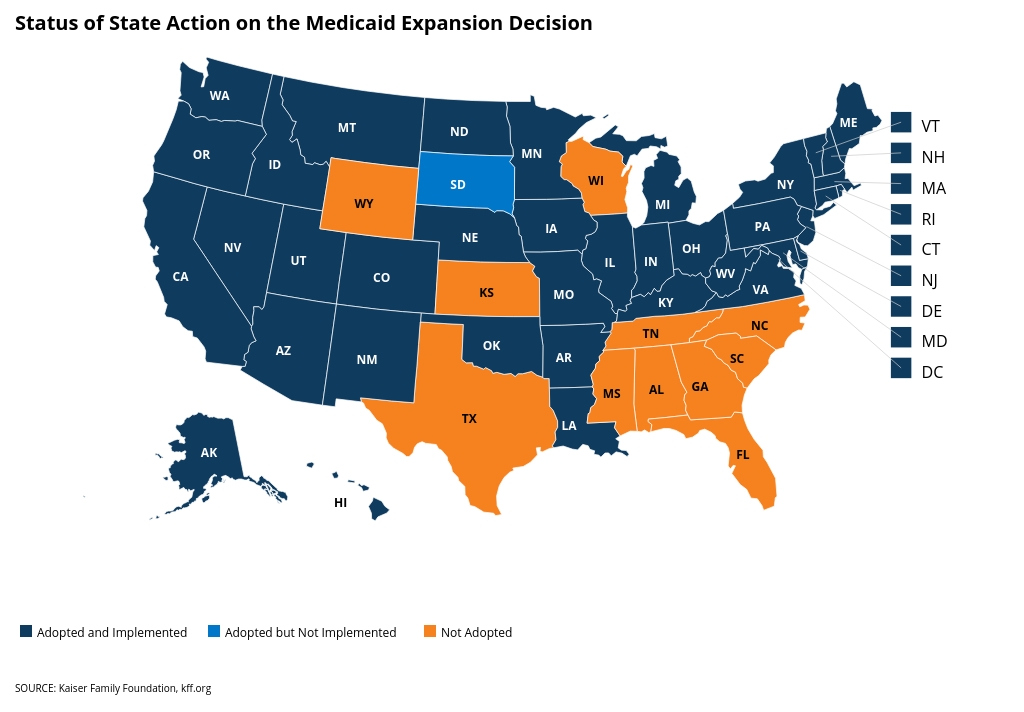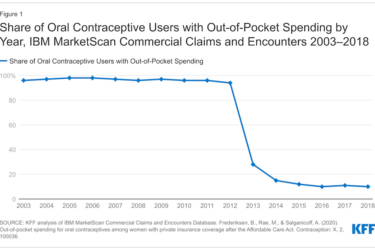South Dakota voters approve amendment to state constitution to expand access to Medicaid (Source: Status of State Medicaid Expansion Decisions: Interactive Map, Kaiser Family Foundation, accessed Nov. 9, 2022.)Even while votes are still being counted, there are important lessons to be learned from the midterm elections on Tuesday.
One of the big lessons is that when voters are asked whether to expand Medicaid, they mostly vote in favor, as happened when South Dakota approved an amendment to the state constitution this week, requiring the state to expand access to Medicaid benefits to low-income residents.
Another big lesson is that when abortion is on the ballot, residents in both red and blue states have favored allowing legal access to this medical procedure. On Tuesday, voters in three blue states and two red states supported access to abortion. Other lessons came from Massachusetts on dental insurance and from Arizona on medical debt.
South Dakota approves Medicaid expansion
Voters in South Dakota approved the amendment to expand access to health insurance under the federal-state Medicaid program. The expansion would affect anyone ages 19 to 64 whose annual income is at or below 133% of the federal poverty level, according to reporting from Dominick Dausch for the Sioux Falls Argus Leader.
For Kaiser Health News, Arielle Zionts explained this issue well when she wrote that South Dakota became the seventh state to approve expansion via the ballot box. “But as other conservative states have shown, voter approval doesn’t always mean politicians and administrators will rush to implement the change,” she added.
Under the amendment, South Dakota would join 39 states and the District of Columbia that have expanded Medicaid enrollment under the Affordable Care Act.
Noting that Republican Kristi Noem is the governor, Dausch wrote: “The amendment is now expected to go before Gov. Kristi Noem, who said she plans to honor the will of the voters and sign off on the legislation, according to comments she made during the gubernatorial debate on Sept. 30.”
“By amending the state constitution, voters would also place Medicaid expansion outside the grasp of the legislature,” wrote Steve Groves, a reporter for the Associated Press. “Roughly 40,000 people would become eligible for Medicaid,” he added.
The Affordable Care Act (ACA) allows all states to expand access to Medicaid. To date, these 11 states have not: Alabama, Florida, Georgia, Kansas, Mississippi, North Carolina, South Carolina, Tennessee, Texas, Wisconsin and Wyoming, according to a report from the Kaiser Family Foundation.
Journalists should note that by passing an amendment to the state constitution, South Dakota followed the example of two other deep-red states: Missouri and Oklahoma. In 2020, both of those states passed constitutional amendments to expand Medicaid, as this blog reported, “What Missouri, Oklahoma teach us about state efforts to expand Medicaid eligibility.”
Voters support abortion access
In other results on Tuesday, voters in California, Michigan and Vermont added protections for abortion access to their states’ constitutions while voters in Kentucky and Montana rejected anti-abortion measures, as Brad Dress reported for The Hill newspaper.
“The midterm elections provided the first national temperature-taking on voter attitudes toward abortion since the U.S. Supreme Court overturned Roe v. Wade in late June, ending federal constitutional protections for the procedure,” as Laura Kusisto and Jennifer Calfas reported for The Wall Street Journal. “The decision returned abortion policy to the states, creating a host of new battlegrounds,” they wrote. We covered that decision the day it was announced.
After SCOTUS eliminated the constitutional right to abortion in June, pro-choice advocates pursued ballot initiatives to support those rights. “The anti-abortion movement suffered a huge blow over the summer when Kansas — a usually reliably red state — slammed down a proposal brought by Republicans, looking to confirm there was no right to abortion in the state constitution,” The Guardian reported.
Votes on medical debt, dental insurance and health care as a right
In three other states, voters approved measures that could have far-reaching effects if similar laws are proposed in other states.
In Arizona, for example, about 75% of voters supported Proposition 209, a measure known as the Predatory Debt Collection Act. The act aims to restructure how medical debt is collected in favor of the indebted party by reducing annual interest rates and protecting some assets from creditors, according to an article late Tuesday in the AZ Mirror by Gloria Rebecca Gomez. While preliminary results favored the measure, they were not final, she added.
In Massachusetts, companies providing dental insurance will need to spend at least 83% of the premiums they collect on patient care and initiatives aimed at improving the quality of care, rather than business expenses such as overhead, marketing and executive salaries, reported Nik DeCosta-Klipa and Gabrielle Emanuel for radio station WBUR in Boston.
Massachusetts is the first state to limit such spending, and advocates hope it will serve as a national model, they wrote. “The new law is set to require insurance companies that don’t reach that minimum percentage, known as a medical loss ratio, to issue rebates to their customers, beginning in 2024,” they added. Under the ACA, health insurers are required to meet similar rules.
Vote counting in Oregon will not be final until next week on a measure to amend the state constitution to declare that affordable health care is a fundamental human right. State law allows ballots postmarked by election day to be counted as long as they arrive by Nov. 15.










